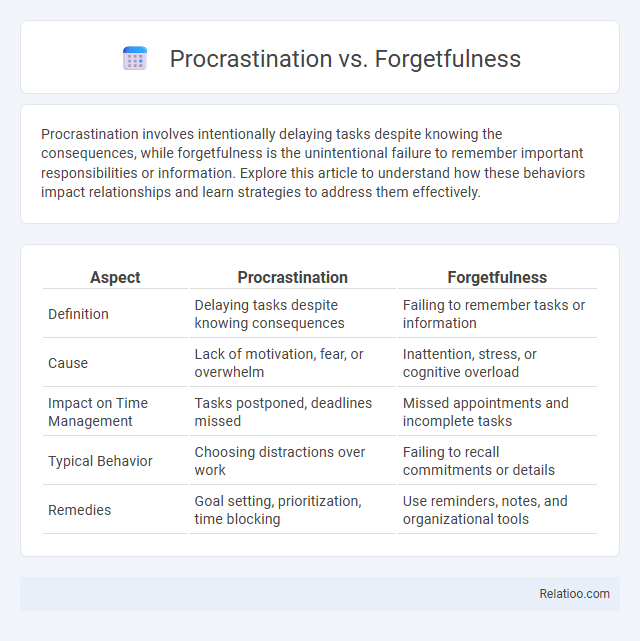Procrastination involves intentionally delaying tasks despite knowing the consequences, while forgetfulness is the unintentional failure to remember important responsibilities or information. Explore this article to understand how these behaviors impact relationships and learn strategies to address them effectively.
Table of Comparison
| Aspect | Procrastination | Forgetfulness |
|---|---|---|
| Definition | Delaying tasks despite knowing consequences | Failing to remember tasks or information |
| Cause | Lack of motivation, fear, or overwhelm | Inattention, stress, or cognitive overload |
| Impact on Time Management | Tasks postponed, deadlines missed | Missed appointments and incomplete tasks |
| Typical Behavior | Choosing distractions over work | Failing to recall commitments or details |
| Remedies | Goal setting, prioritization, time blocking | Use reminders, notes, and organizational tools |
Understanding Procrastination: Definition and Causes
Procrastination involves delaying tasks despite expecting negative consequences, often driven by fear of failure, lack of motivation, or poor time management. Forgetfulness refers to the unintentional failure to recall information, commonly caused by stress, aging, or distraction, and differs fundamentally from procrastination's behavioral aspect. Understanding procrastination requires recognizing its psychological roots, including anxiety and perfectionism, which distinguish it from simple forgetfulness or memory lapses.
What is Forgetfulness? Key Characteristics
Forgetfulness is the inability to recall information or events, often characterized by frequent lapses in memory or difficulty retrieving names, dates, and tasks. Unlike procrastination, which involves delaying actions intentionally, forgetfulness is typically unintentional and can be caused by stress, aging, or distractions. Your awareness of these key characteristics can help distinguish forgetfulness from other cognitive challenges and prompt strategies to improve memory retention.
Procrastination vs Forgetfulness: Core Differences
Procrastination involves the deliberate delay of tasks despite knowing the negative consequences, while forgetfulness is an unintentional failure to recall information or complete tasks. Understanding these core differences helps you identify whether your challenge stems from a motivational issue or memory lapse. Addressing procrastination often requires behavioral strategies, whereas forgetfulness may benefit from memory aids or organizational tools.
Psychological Factors Behind Procrastination
Procrastination stems from complex psychological factors including fear of failure, perfectionism, and anxiety, which differ from the simple memory lapses associated with forgetfulness. Unlike forgetfulness, procrastination involves intentional delay despite knowing the negative consequences, often linked to emotional regulation difficulties in the brain's prefrontal cortex. Understanding these underlying mental barriers can help you develop strategies to overcome procrastination and improve productivity.
Cognitive Reasons for Forgetfulness
Cognitive reasons for forgetfulness primarily involve impaired encoding, storage, and retrieval processes in the brain, often linked to attention deficits, reduced working memory capacity, and executive function dysfunction. Unlike procrastination, which is a voluntary delay in task initiation despite awareness, forgetfulness results from lapses in memory consolidation or retrieval, frequently caused by distractions, stress, or neurological conditions. Understanding these cognitive deficits helps differentiate forgetfulness from procrastination and guides targeted strategies for memory enhancement and cognitive rehabilitation.
How Procrastination Impacts Productivity
Procrastination significantly reduces productivity by delaying task initiation and increasing stress levels, which impairs focus and work quality. Unlike forgetfulness, which is often unintentional memory lapses, procrastination is a conscious delay driven by avoidance behaviors and low motivation. Addressing procrastination with time management techniques enhances efficiency and helps maintain consistent productivity.
The Consequences of Chronic Forgetfulness
Chronic forgetfulness significantly impairs daily functioning by disrupting memory retention and recall, which can lead to missed deadlines and poor decision-making. Unlike procrastination, which involves delaying tasks deliberately, forgetfulness often results from neurological factors affecting cognitive processes such as attention and working memory. The cumulative effect includes decreased productivity, increased stress levels, and potential long-term cognitive decline if left unaddressed.
Practical Strategies to Overcome Procrastination
Procrastination involves delaying tasks despite knowing the consequences, while forgetfulness is the unintentional failure to remember important information, often due to distractions or stress. Practical strategies to overcome procrastination include breaking tasks into smaller, manageable steps, setting specific deadlines, and using tools like calendars or reminders to keep your goals on track. By prioritizing your time and enhancing focus, you can effectively reduce procrastination and improve productivity.
Tips for Managing and Reducing Forgetfulness
Procrastination, forgetfulness, and confusion often overlap but stem from different cognitive causes requiring tailored approaches. To manage and reduce forgetfulness effectively, prioritize establishing routines, use memory aids like lists or digital reminders, and practice mindfulness to improve focus. Your brain benefits from adequate sleep, regular exercise, and balanced nutrition, all essential for enhancing memory retention and cognitive function.
Choosing the Right Approach: Addressing Both Issues
Procrastination involves delaying tasks despite knowing their importance, while forgetfulness is an unintentional failure to recall information or deadlines. Your best approach balances structured time management techniques to combat procrastination with memory aids like reminders and notes to reduce forgetfulness. Combining these strategies ensures improved productivity and mental clarity by targeting both deliberate avoidance and cognitive lapses.

Infographic: Procrastination vs Forgetfulness
 relatioo.com
relatioo.com